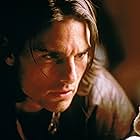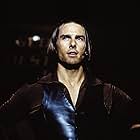An epic mosaic of interrelated characters in search of love, forgiveness and meaning in the San Fernando Valley.An epic mosaic of interrelated characters in search of love, forgiveness and meaning in the San Fernando Valley.An epic mosaic of interrelated characters in search of love, forgiveness and meaning in the San Fernando Valley.
- Nominated for 3 Oscars
- 28 wins & 59 nominations total
Mark Flanagan
- Joseph Green
- (as Mark Flannagan)
- Director
- Writer
- All cast & crew
- Production, box office & more at IMDbPro
Storyline
Did you know
- TriviaThe story about the man being killed by a gunshot while falling off a building has for years been used as a hypothetical case in criminal law classes to illustrate causation.
- GoofsIn the "Wise Up" sequence, Claudia is dressed for her date, she's wearing black and her hair is up. When she opens the door to Jim, she's wearing red, her hair is down. On the way to the car, she is again wearing black etc, and at the restaurant she is back wearing red.
- Quotes
Jimmy Gator: The book says, "We might be through with the past, but the past ain't through with us."
- Crazy creditsUnderneath the title at the end a line reads "for fa and ea". fa is Fiona Apple (Paul Thomas Anderson's girlfriend) ea is Ernie Anderson (Paul Thomas Anderson's father)
- Alternate versionsThe supplemental material disc of the R1 special edition DVD of Magnolia has about 8 minutes of hidden outtake footage. To access it, you need to select the 'Color Bars' option and wait about twenty seconds.
- ConnectionsFeatured in The Johnny Vaughan Film Show: Episode #1.1 (1999)
Featured review
I have never before spent so much time analyzing, discussing, or viewing a film...
And it is a FILM. It is no ordinary movie. As a fan of Boogie Nights, I couldn't wait for Magnolia. Although its running time has made at least 20 people leave the auditorium, I have stayed for every single second. The mood and stories and characters keep building and building and building, and when it finally comes down, I feel this immense sense of relief and wonder at how PT Anderson was able to come up with something so clever and intertwining and wonderous, and was able to pull it off. This "movie" is not for everyone. It is thinking-hat required. I have also never been so excited to look up Bible verses before. The cast, as you have probably read, is superb. I have never been so impressed. This film has "restored my faith in the filmmaking industry. To see these actors, crew, and the writer/director/genius at work is inspiring." These people obviously love their craft, and one of my friends even said that the cast was "touched by the hands of God..." to which I whole-heartedly agree. He also has said, ""This film not only teaches film makers how to make films, but it teaches movie watchers how to watch movies!" to which I again whole-heartedly agree a thousand times over. Phillip Seymour Hoffman is absolutely outstanding as the only character who is "normal." His performance has made me smile and shake my fist in the air the three times I've seen Magnolia since it opened. Tom Cruise is also spectacular. As with every single last character, every line he utters is important to his character and what it means for the rest of the stories. Another outstanding performance/character is the part of police officer Jim Kurring, played by John C. Reilly. His character is just so perfect and JUST SOOOOO PERFECT that it makes me smile every time he is on screen. Add to all of this one incredible soundtrack, and you have something that will go down in film history as legend and probably one of the most underappreciated, misunderstood, and definitely underseen films of all time.
The soundtrack, oh, the soundtrack. When listening to the songs, I can picture each exact moment as if I was watching the movie all over again, and it brings unexplainable feeling. Aimee Mann's songs, especially, are a perfect fit to a perfect story and mood. This film is not for everyone, but, if you want to see glorious filmmaking, acting, writing, and characters in action, I HIGHLY suggest you see Magnolia.
The soundtrack, oh, the soundtrack. When listening to the songs, I can picture each exact moment as if I was watching the movie all over again, and it brings unexplainable feeling. Aimee Mann's songs, especially, are a perfect fit to a perfect story and mood. This film is not for everyone, but, if you want to see glorious filmmaking, acting, writing, and characters in action, I HIGHLY suggest you see Magnolia.
helpful•480182
- McWoop
- Jan 12, 2000
Details
- Release date
- Country of origin
- Languages
- Also known as
- Mag·no'li·a
- Filming locations
- Production companies
- See more company credits at IMDbPro
Box office
- Budget
- $37,000,000 (estimated)
- Gross US & Canada
- $22,455,976
- Opening weekend US & Canada
- $193,604
- Dec 19, 1999
- Gross worldwide
- $48,453,541
- Runtime3 hours 8 minutes
- Color
- Sound mix
- Aspect ratio
- 2.39 : 1
Contribute to this page
Suggest an edit or add missing content











































